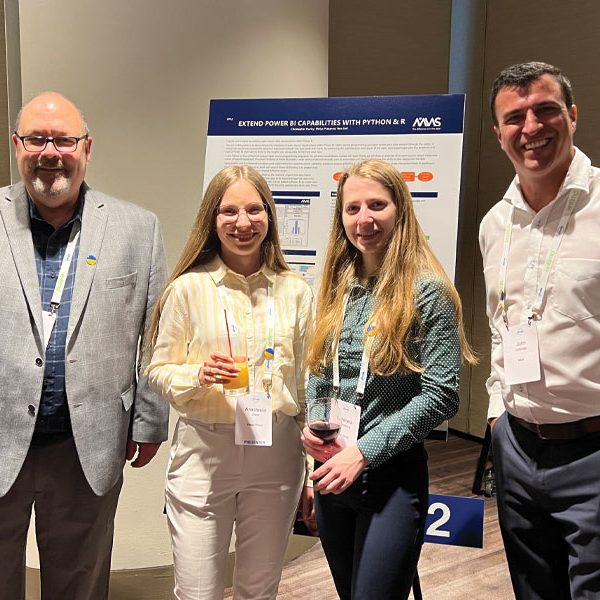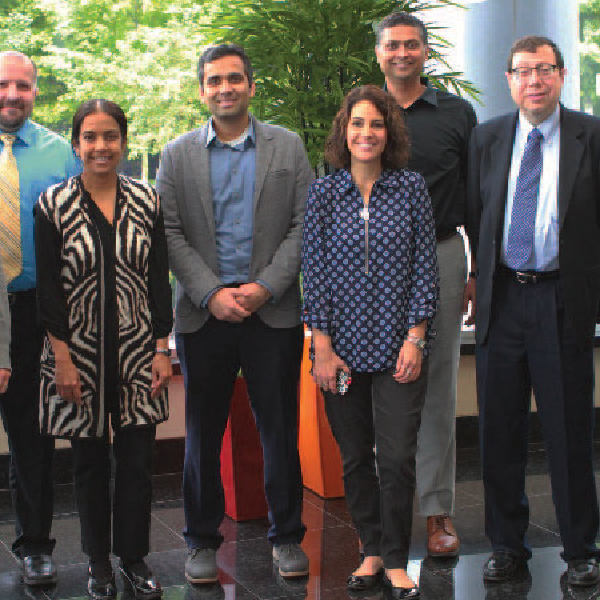Solving Data Complexity with Real-Time Insights, Predictive AI, and Smarter Decision-Making with Datacise

Fresh off a major award win for Datacise®, the Perspectives team sat down with Kris Wenzel, MBA, Senior Manager of Data Science at MMS, to talk about how this powerful clinical data platform is changing the way that Sponsors manage and act on their clinical trial data.
From streamlining insights to enabling predictive, AI-driven decision-making, Datacise is gaining traction as a go-to solution for pharmaceutical and biotech teams looking to improve clinical data quality, accelerate cycle times, and enhance decision-making. We caught up with Wenzel to hear more about what’s next for Datacise and the future of data-driven drug development.
Question: What does this recognition mean to the Datacise team at MMS?
Answer: We are incredibly honored by this recognition. It validates the collaboration and innovation our entire team has put into Datacise, from data scientists to clinical experts and engineers. This award is especially meaningful because it comes from industry voices who understand the challenges of modern trials.
Sponsors today face growing complexity, tighter timelines, and increasing pressure to act on real-time insights. Datacise was built for exactly that, boosting efficiency across data aggregation and analysis workflows, while giving teams clear visibility into clinical trial performance: enabling faster, data-driven decisions, and helping prevent issues before they cause delays. It is rewarding to see that mission recognized and to know we are meeting a real need in today’s data-driven clinical landscape.
Question: For those who may not be familiar, can you explain how Datacise is helping pharmaceutical companies make smarter, faster decisions in clinical development?
Clinical trials are full of critical decision points, like tracking enrollment, monitoring safety, or responding to site issues, and every one of those decisions relies on timely, trustworthy data. Datacise speeds that process up significantly.
We pull data from across sources that include EDC, labs, imaging, SDTM, ADaM. Then, we bring it into a single, harmonized view. There is no more waiting on siloed systems or custom reports. With over 40 pre-built dashboards, teams get immediate access to the insights they need, whether they are in data management, safety, or medical review. This is increasingly important in the light of increasing data variety, velocity, and volume.
What sets Datacise apart is how quickly it delivers impact as part of an end-to-end biometrics approach, with no heavy adoption curve for internal teams. It’s ‘right-sized’ for the needs of every size of Sponsor, especially small to mid-sized biotechs that need tech-enabled services to compete in our evolving industry. We see Sponsors realizing the value from this innovative new approach in weeks, not months, as part of their partnership with us as their data-focused CRO of choice. This helps make informed decisions faster, reduces risk, and keeps trials on track.
Question: The industry is placing more emphasis on data-driven decision-making. How does Datacise empower Sponsors to act on insights in real-time?
We built Datacise to support near real-time decision-making from day one- empowering both sponsors and our internal data teams delivering our biometrics solutions. The platform integrates with clinical data sources as information is collected, whether that’s daily EDC exports or weekly lab feeds. Our ingestion process automatically blends and harmonizes these data sources, so every morning users have fresh insights ready for review.
Let’s say a safety signal is emerging, Datacise can give medical monitors the ability to spot it and take action before it becomes a trend. Or, maybe a site is under-enrolling or struggling with protocol compliance. That kind of operational visibility in real time allows Sponsors to intervene quickly and course correct. Importantly, conducting and demonstrating oversight of their vendors and sites is a regulatory imperative as part of the ICH (E6) R3 guidance on sponsor oversight.
It’s about giving teams not just access to data, but access to the right data at the right time and making sure it’s actionable.
Question: How do you see Datacise evolving as part of a broader push toward more predictive, AI-driven decision-making in clinical development, and what advice would you give to sponsors who are still relying on traditional methods?
We are expanding Datacise in two key areas: smarter data ingestion and smarter interaction. On the backend, we are integrating AI to streamline data curation from inconsistent source formats, which helps us onboard new studies faster and with fewer manual steps.
On the frontend, as part of our roadmap we’re building more intuitive ways to engage with data. One example is our “Ask the Data” feature, a natural language tool powered by LLMs. It allows users to type a question like “Which patients had elevated ALT and nausea in the same week?” and get instant, visual answers. This kind of interaction unlocks faster insights and improves cross-functional collaboration.
For Sponsors still relying on static reports and fragmented data sources, the risk is real. Clinical trials are more complex, and the cost of slow or missed decisions is only increasing. Sponsors need tools that deliver real-time visibility, support oversight, and adapt to non-EDC data streams. Predictive analytics is no longer a nice-to-have. It’s becoming essential to trial speed, quality, and submission success. As a specialized data CRO, we are able to deliver greater value, insights and results to our sponsors with technology-enabled services underpinned by Datacise.
Question: As someone leading innovation in clinical data solutions, what excites you most about the next generation of tools and technologies in drug development, and how are you preparing Datacise to meet the evolving needs?
What excites me most is the opportunity to remove friction from the entire data lifecycle. Not long ago, clinical data moved slowly—weeks or even months from collection to insight. Now, with intelligent automation, LLMs, and retrieval-augmented generation, we are closing that gap and moving toward near real-time intelligence.
The next generation of tools will be dynamic and intuitive. Instead of waiting on reports, users will engage directly with the data. Our “Ask the Data” feature is a step in that direction. It allows users to query complex clinical scenarios in plain language and get instant, visual answers.
We are also designing Datacise to deeply understand standardized models like CDASH and SDTM. This means the platform can surface patterns, identify risks, and support proactive decisions without needing layers of manual review.
The goal is to create a system that not only responds to user queries but anticipates them. We are building Datacise to grow alongside the needs of Sponsors, offering the flexibility, speed, and intelligence that modern clinical trials require.
If you’re interested in learning more about Datacise or how MMS can help your clinical team accelerate insights and improve trial performance, email info@mmsholdings.com to get in touch with our biometrics experts.











